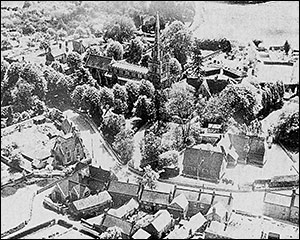|
 |
|
Aerial view of the two Church Schools
taken in 1953
|
In 1876, the Duke of Buccleuch donated a site for a proposed infant school and this was constructed in 1878 at a cost of £800. The headmistress, Mary Ann Stalker, was the wife of the Free School headmaster, David Stalker, and she remained at the school for 30 years. The school was described as “the model school of the district, admirably conducted and always obtaining the highest possible grant”. This school would have been a larger building had the trustees been aware at the time of the prospective house building in the village.
The Free School was again enlarged in 1889 at a cost of £340 to the “utmost limit of the ground”.
In 1890 the function of the two schools changed in that the old Free Grammar school was used as an Infant School, whilst the purpose-built Infant School, opposite, was doubled in space at a cost of £1,226 – additional land being acquired from the adjoining Manor House property – to become the Mixed Boys and Girls School. A quote from this time reads, “Few village schools, certainly none in the neighbourhood could compare with it for healthiness of situation and completeness of its fittings.” High grants obtained by Mr and Mrs Stalker enabled trustees to put aside a certain portion of the endowment for several years towards additions and improvements.
Much of the above information was obtained from a “Report – A Thirty Years’ Retrospect” by the then Rector of the parish, F B Newman, dated 1895, and was obviously intended as propaganda against the threat of Board schools which was about to erupt at this time. This final paragraph from the document shows the current line being taken by the Church in the village:
|
“It has been uphill work to find the money for so much building in addition to the funds for maintaining the schools in a high state of efficiency. But it is considered that no great difficulty will be experienced when the debt is paid off and when the Voluntary Schools throughout the country get what they ought to have, and will certainly very soon, obtain viz further assistance from the State: for it cannot longer be tolerated that these Voluntary Schools, which have done all the educational work in bygone times, and which are now educating by far the greater number of children in the country districts, should be placed in a worse position as regards funds, than the Board schools which we see rising on all sides of us.
“It is a satisfaction to think that the long-endured hardship of those who have both to maintain their own schools, and in addition to pay rates in support of the Board schools, is doomed, and that a more equitable condition of things is in contemplation and may reasonably be expected to find its way into the statute book in the near future.”
|
|
